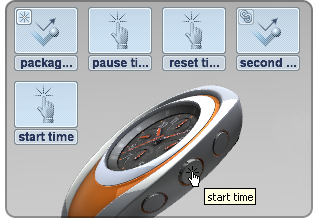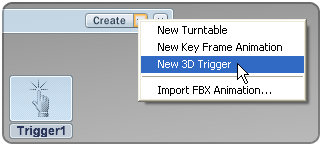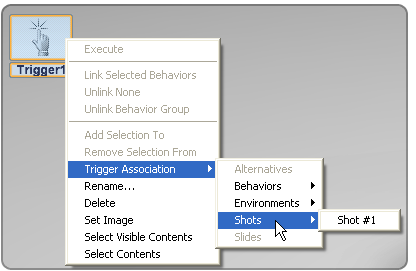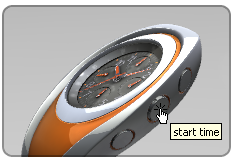Show in Contents

Add to Favorites

Home: Autodesk Showcase Help

Create a Key Frame Animation

Add behaviors

Import an FBX Animation

Set 3D triggers in the scene
3D triggers add interactive
control and annotations to your scene while in Presentation mode,
and can be linked together to cause many items to change or acitvate
at once. A trigger makes specific objects in your scene “clickable”
which can then cause another scene item to be activated in the scene.
Triggers are created and defined in the Behaviors interface, but
can activate behaviors, alternatives, shots, storyboard slides and environments.
For more information
on Presentation mode, see:
Present the scene
Items that can be triggered
- Alternatives: any
geometry, material, or positional alternative, in any lineup.
- Behaviors: turntables,
key frame animations, imported FBX animations. With playback direction
and type options.
- Environments:any
environment in the scene.
- Shots:both animated
and still shots.
- Storyboard Slides: containing
many of the items above, triggered at once.
Create a 3D trigger
- Press B to show
the Behaviors interface.
- Select the objects in the scene you wish
to make into a clickable object.
NoteIf an object is selected when the trigger
is created, it will automatically be associated with the 3D trigger
as the clickable geometry in the scene.
- Click the arrow beside the Create button
and select New 3D Trigger.
A new 3D trigger is added , with an icon in
the Behaviors interface.
- Right-click on the trigger icon and select
the item in the scene to activate when the 3D trigger is clicked
.
Associate an item with
a 3D trigger
Alternately, an item
can be associated to the trigger, as opposed to associating the
trigger with the item. The results are the same.
- Right-click on the item icon in its overlay
interface (Shots, Behaviors, Alternatives, Environments, Storyboard).
- Select Associate Trigger from
the context menu.
All
triggers in the scene will be listed, with any existing associations
next to them.
NoteIf a trigger already
has an item associated with it, any new association will overwrite
the previous one, with no undo.
- Select the 3D trigger to associate with
the item.
The
item will then be activated by this trigger, and the icon for the
item will have a Trigger label in the upper left corner of the icon.
View and test interactive
3D triggers
- Press Tab to
enter Presentation mode.
- Place the cursor over your object in
the viewport.
The
cursor will change to a hand, and the name of the 3D trigger wil
be displayed as a tooltip (if Trigger notifications are enabled).
NoteTo disable the 3D
trigger name from showing as a tooltip, go to the Behaviors menu,
and select .
It will show as unchecked when they are not shown.
- Click on the geometry to activate the
item that is associated with that 3D trigger.
Add geometry to a 3D
trigger
To change or expand the
scene geometry that will be clickable in Presentation mode, add
objects to the 3D trigger.
- Press B to show
the Behaviors interface.
- Select the objects in the scene you wish
to make into a clickable object.
NoteIf an object is selected when the trigger
is created, it will automatically be associated with the 3D trigger
as the clickable geometry in the scene.
- Right-click on the trigger icon and select Add
Selection To.
The
selected objects will activate the trigger when clicked in Presentation mode.
Remove geometry from
a 3D trigger
To change or minimize
the scene geometry that will be clickable in Presentation mode,
remove objects to the 3D trigger.
NoteIf
no scene geometry is associated with a 3D trigger, it will only
be activated when right-clicking the 3D trigger icon and selecting Execute.
- Press B to show
the Behaviors interface.
- Select the objects in the scene you wish
to remove from the 3D trigger.
To see what scene geometry is already a part
of the 3D trigger, right-click on the trigger icon and select Select
Visible Contents. Ctrl-click on any
- Right-click on the trigger icon and select Remove
Selection From.
The selected objects will no longer activate
the items associated with that trigger.
Link 3D Triggers together
3D triggers can be linked
together or to other behaviors in the scene to activate all at the
same time. Triggers without any geometry associated with them can
also be linked to other triggers to create networks of simultaneous
actions from a single “click” on a single object in the scene.
For more information
on linking behaviors, see:
Link multiple behaviors together



![]()

